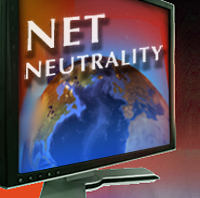| Political Opposition to Destructive “Net Neutrality” Gains Momentum |
 |
|
By Timothy H. Lee
Thursday, October 08 2009 |
Federal Communications Commission (FCC) Chairman Julius Genachowski, apparently lacking any sense of irony, warned this week of a “looming crisis” in wireless Internet capacity, even while he simultaneously proposes “Net Neutrality” rules that would exacerbate the problem. Speaking at a wireless industry convention, Chairman Genachowski astonishingly sounded the alarm that current infrastructure and capacity levels are unprepared for an “explosion” in wireless data traffic. He noted that “many anticipate a thirty-fold increase in wireless traffic,” seemingly oblivious to the fact that his own regulations would compound this danger. He asked, “What happens when every mobile user has an iPhone, a Palm Pre, a BlackBerry Tour or whatever the next device is? What happens when we quadruple the number of subscribers with mobile broadband on their laptops or netbooks?” Good questions. But the question he should instead be asking himself is, “what effect will Net Neutrality regulations have on the wireless industry’s ability to address that dilemma?” The simple answer is that it will stifle Internet innovation and investment at the very moment when continued Web and telecommunications growth is most critical. Although the term “Net Neutrality” sounds innocuous enough, its name conceals very destructive consequences. Instead of an open Internet in which competing service providers and wireless carriers remain free to experiment with alternative models, Net Neutrality would for the first time impose regulatory control on one of the few flourishing sectors in our current economy. That’s hardly “neutral.” For instance, carriers would suddenly be prohibited from offering differentiated services, prioritization and other innovative methods to address the problem of bandwidth constraint. Currently, a very small number of Internet users consume an enormously disproportionate share of data usage, resulting in bottlenecks for everyone. As explained by AT&T’s wireless chief Ralph de la Vega, “if we don’t find a way to keep them from crowding out others, we’re going to have a very significant issue.” In the past five years alone, Internet service providers have found a way to accommodate explosive bandwidth growth from 262 kilobits per second to a remarkable 3 megabits per second, and Internet traffic growth from 170 million gigabytes per month to 2 billion gigabytes per month, according to Bret Swanson of Entropy Economics LLC. In the past three years alone, private wireless companies have invested over $100 billion in successfully managing this enormous increase in data traffic over their networks. But Net Neutrality would stifle incentives to continue investment to meet future traffic growth. It would take an Internet that has flourished since its inception precisely because it remained free of bureaucratic control, and dictate operating methods and business models for the first time. Net Neutrality advocates bizarrely argue that it is somehow necessary to prevent discrimination and blockage by service providers, but they cannot identify any pattern of discriminatory conduct since the Internet’s inception. Think of it as the Fairness Doctrine or McCain-Feingold for the Internet. Or a mythical solution in search of an imaginary problem. Fortunately, people are waking up to the danger posed by Net Neutrality, and political opposition is finally gaining momentum. This week, twenty members of the House of Representatives, led by Congressman Cliff Stearns (R – Florida) sent a letter to Chairman Genachowski seeking a delay in the scheduled October 22 vote on his proposal. Their letter warned that Net Neutrality would discourage network investment by broadband providers, and that American consumers would ultimately suffer the burden. They therefore requested that Chairman Genachowski undertake a “thorough market analysis” into the supposed rationale for his proposal. House Minority Leader John Boehner (R – Ohio) and House Republican Whip Eric Cantor (R – Virginia) expressed the same concerns in a letter to President Obama last week, and Senator Kay Bailey Hutchison (R – Texas) is reportedly considering a bill to prohibit the FCC from imposing formal Net Neutrality regulations. This is welcome news at a time when most Americans remain unaware of the threat posed by Net Neutrality. The Internet has survived reasonably well to date without the corrosive presence of Net Neutrality, and the frightening reality is that Chairman Genachowski’s proposal would stifle Web growth and innovation. Now is simply not the time to dim one of the nation’s few bright lights with the Obama Administration’s latest foray into unwarranted regulation.
|
Related Articles : |

























